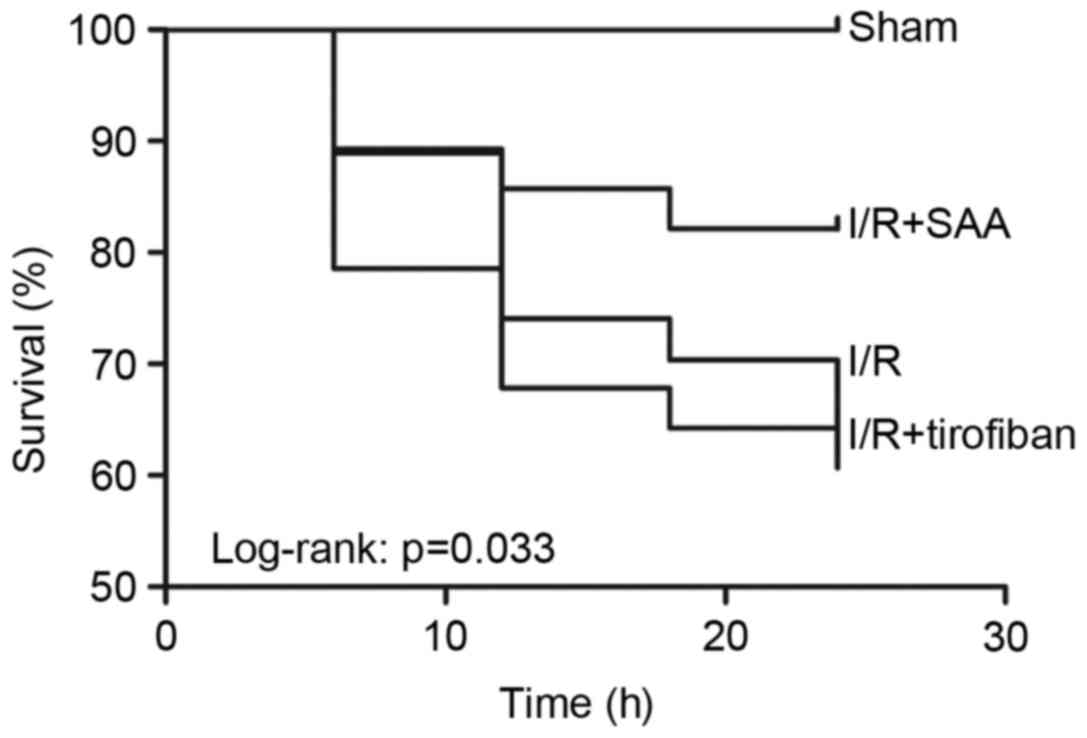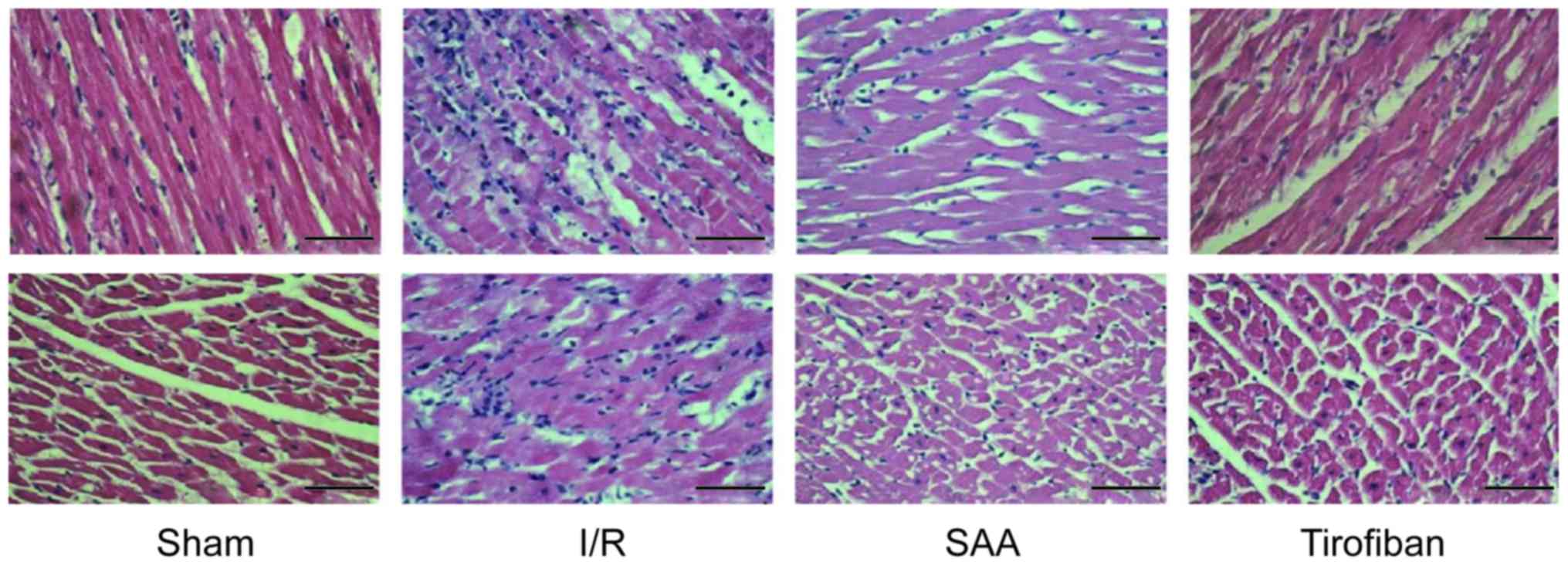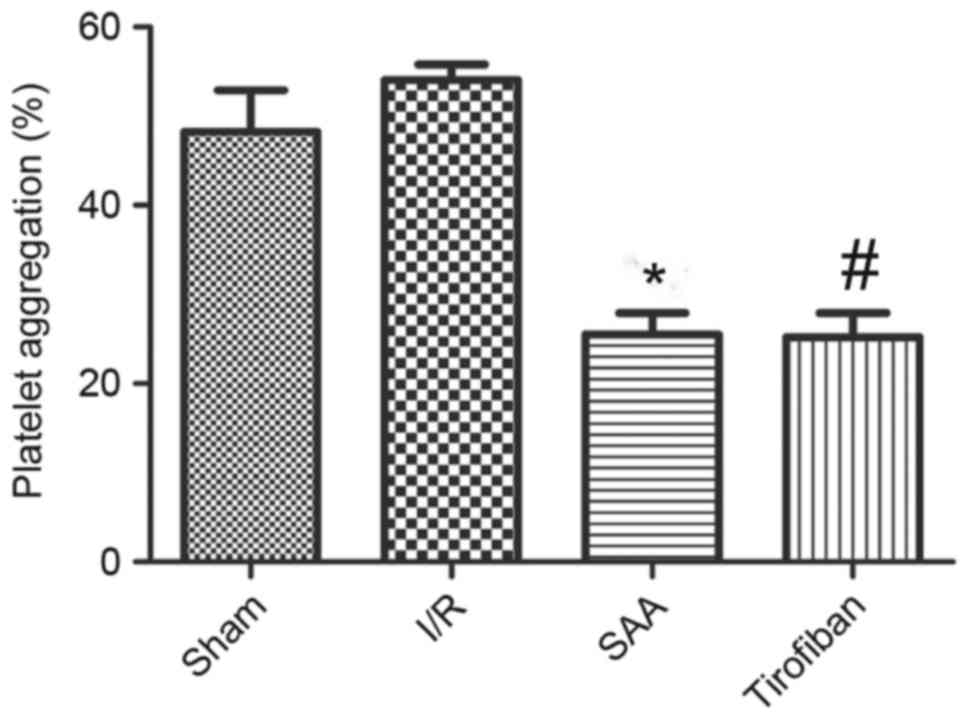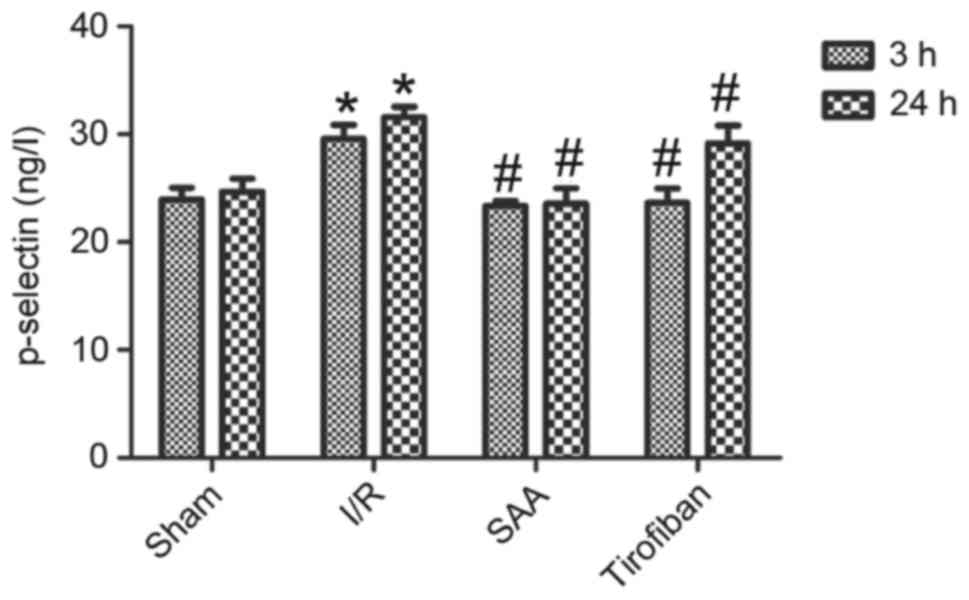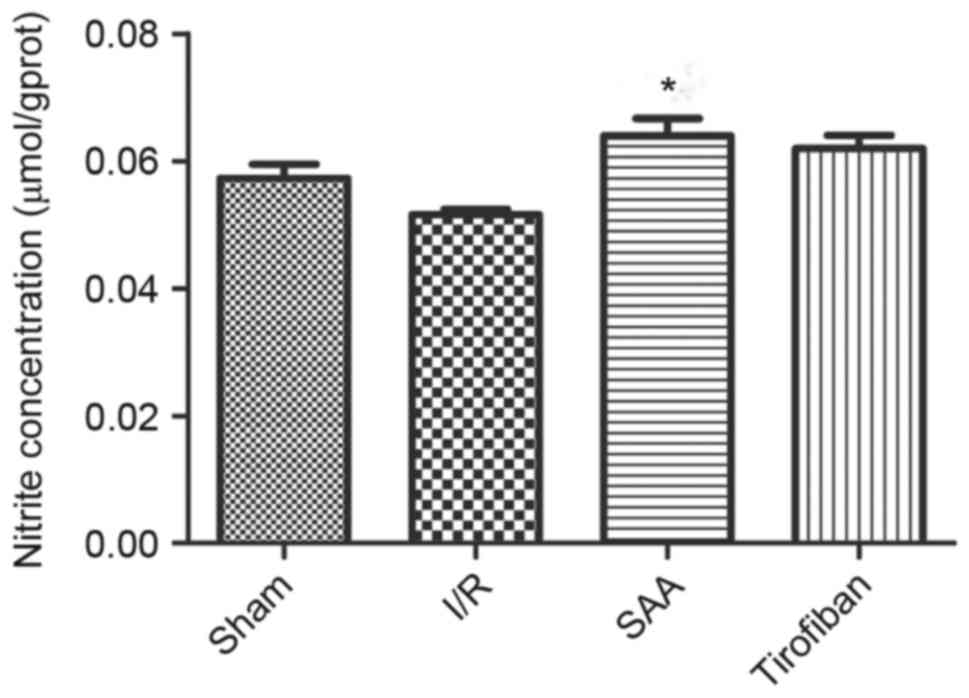|
1
|
Moran AE, Forouzanfar MH, Roth GA, Mensah
GA, Ezzati M, Flaxman A, Murray CJ and Naghavi M: The global burden
of ischemic heart disease in 1990 and 2010: The Global Burden of
Disease 2010 study. Circulation. 129:1493–1501. 2014. View Article : Google Scholar : PubMed/NCBI
|
|
2
|
Fröhlich GM, Meier P, White SK, Yellon DM
and Hausenloy DJ: Myocardial reperfusion injury: Looking beyond
primary PCI. Eur Heart J. 34:1714–1722. 2013. View Article : Google Scholar : PubMed/NCBI
|
|
3
|
Becker LC and Ambrosio G: Myocardial
consequences of reperfusion. Prog Cardiovasc Dis. 30:23–44. 1987.
View Article : Google Scholar : PubMed/NCBI
|
|
4
|
Maxwell SR and Lip GY: Reperfusion injury:
A review of the pathophysiology, clinical manifestations and
therapeutic options. Int J Cardiol. 58:95–117. 1997. View Article : Google Scholar : PubMed/NCBI
|
|
5
|
Piper HM, Meuter K and Schäfer C: Cellular
mechanisms of ischemia-reperfusion injury. Ann Thorac Surg.
75:S644–S648. 2003. View Article : Google Scholar : PubMed/NCBI
|
|
6
|
Pachel C, Mathes D, Arias-Loza AP,
Heitzmann W, Nordbeck P, Deppermann C, Lorenz V, Hofmann U,
Nieswandt B and Frantz S: Inhibition of platelet GPVI protects
against myocardial ischemia-reperfusion injury. Arterioscler Thromb
Vasc Biol. 36:629–635. 2016. View Article : Google Scholar : PubMed/NCBI
|
|
7
|
Gawaz M, Langer H and May AE: Platelets in
inflammation and atherogenesis. J Clin Invest. 115:3378–3384. 2005.
View Article : Google Scholar : PubMed/NCBI
|
|
8
|
Klinger MH and Jelkmann W: Role of blood
platelets in infection and inflammation. J Interferon Cytokine Res.
22:913–922. 2002. View Article : Google Scholar : PubMed/NCBI
|
|
9
|
Skyschally A, Erbel R and Heusch G:
Coronary microembolization. Circ J. 67:279–286. 2003. View Article : Google Scholar : PubMed/NCBI
|
|
10
|
Liu X and Tao GZ: Effects of tirofiban on
the reperfusion-related no-reflow in rats with acute myocardial
infarction. J Geriatr Cardiol. 10:52–58. 2013.PubMed/NCBI
|
|
11
|
Howard JP, Jones DA, Gallagher S, Rathod
K, Antoniou S, Wright P, Knight C, Mathur A, Weerackody R and Wragg
A: Glycoprotein IIb/IIIa inhibitors use and outcome after
percutaneous coronary intervention for non-ST elevation myocardial
infarction. Biomed Res Int. 2014:6439812014. View Article : Google Scholar : PubMed/NCBI
|
|
12
|
Cheng TO: Cardiovascular effects of
Danshen. Int J Cardiol. 121:9–22. 2007. View Article : Google Scholar : PubMed/NCBI
|
|
13
|
Han JY, Fan JY, Horie Y, Miura S, Cui DH,
Ishii H, Hibi T, Tsuneki H and Kimura I: Ameliorating effects of
compounds derived from Salvia miltiorrhiza root extract on
microcirculatory disturbance and target organ injury by ischemia
and reperfusion. Pharmacol Ther. 117:280–295. 2008. View Article : Google Scholar : PubMed/NCBI
|
|
14
|
Lian-Niang L, Rui T and Wei-Ming C:
Salvianolic acid A, a new depside from roots of Salvia
miltiorrhiza. Planta Med. 50:227–228. 1984. View Article : Google Scholar : PubMed/NCBI
|
|
15
|
Huang ZS, Zeng CL, Zhu LJ, Jiang L, Li N
and Hu H: Salvianolic acid A inhibits platelet activation and
arterial thrombosis via inhibition of phosphoinositide 3-kinase. J
Thromb Haemost. 8:1383–1393. 2010. View Article : Google Scholar : PubMed/NCBI
|
|
16
|
Moncada S, Palmer RM and Higgs EA: Nitric
oxide: Physiology, pathophysiology, and pharmacology. Pharmacol
Rev. 43:109–142. 1991.PubMed/NCBI
|
|
17
|
Liu X and Tao GZ: Effects of tirofiban on
the reperfusion-related no-reflow in rats with acute myocardial
infarction. J Geriatr Cardiol. 10:52–58. 2013.PubMed/NCBI
|
|
18
|
Ruggeri ZM: Platelets in atherothrombosis.
Nat Med. 8:1227–1234. 2002. View Article : Google Scholar : PubMed/NCBI
|
|
19
|
Hansen PR: Inflammatory alterations in the
myocardial microcirculation. J Mol Cell Cardiol. 30:2555–2559.
1998. View Article : Google Scholar : PubMed/NCBI
|
|
20
|
Vinten-Johansen J, Jiang R, Reeves JG,
Mykytenko J, Deneve J and Jobe LJ: Inflammation, proinflammatory
mediators and myocardial ischemia-reperfusion injury. Hematol Oncol
Clin North Am. 21:123–145. 2007. View Article : Google Scholar : PubMed/NCBI
|
|
21
|
Li J, Gu T, Fu X and Zhao R: Effect of
salvianolic acid A and C compatibility on inflammatory cytokines in
rats with unilateral ureteral obstruction. J Tradit Chin Med.
35:564–70. 2015. View Article : Google Scholar : PubMed/NCBI
|
|
22
|
Rendu F and Brohard-Bohn B: The platelet
release reaction: Granules' constituents, secretion and functions.
Platelets. 12:261–273. 2001. View Article : Google Scholar : PubMed/NCBI
|
|
23
|
Neumann FJ, Marx N, Gawaz M, Brand K, Ott
I, Rokitta C, Sticherling C, Meinl C, May A and Schömig A:
Induction of cytokine expression in leukocytes by binding of
thrombin-stimulated platelets. Circulation. 95:2387–2394. 1997.
View Article : Google Scholar : PubMed/NCBI
|
|
24
|
Gawaz M, Neumann FJ, Dickfeld T, Koch W,
Laugwitz KL, Adelsberger H, Langenbrink K, Page S, Neumeier D,
Schömig A and Brand K: Activated platelets induce monocyte
chemotactic protein-1 secretion and surface expression of
intercellular adhesion molecule-1 on endothelial cells.
Circulation. 98:1164–1171. 1998. View Article : Google Scholar : PubMed/NCBI
|
|
25
|
Massberg S, Enders G, Leiderer R,
Eisenmenger S, Vestweber D, Krombach F and Messmer K:
Platelet-endothelial cell interactions during ischemia/reperfusion:
The role of P-selectin. Blood. 92:507–515. 1998.PubMed/NCBI
|
|
26
|
Rafikov R, Fonseca FV, Kumar S, Pardo D,
Darragh C, Elms S, Fulton D and Black SM: eNOS activation and NO
function: Structural motifs responsible for the posttranslational
control of endothelial nitric oxide synthase activity. J
Endocrinol. 210:271–284. 2011. View Article : Google Scholar : PubMed/NCBI
|
|
27
|
Yang D, Xie P and Liu Z:
Ischemia/reperfusion-induced MKP-3 impairs endothelial NO formation
via inactivation of ERK1/2 pathway. PLoS One. 7:e420762012.
View Article : Google Scholar : PubMed/NCBI
|
|
28
|
Pan H, Li D, Fang F, Chen D, Qi L, Zhang
R, Xu T and Sun H: Salvianolic acid A demonstrates cardioprotective
effects in rat hearts and cardiomyocytes after ischemia/reperfusion
injury. J Cardiovasc Pharmacol. 58:535–542. 2011. View Article : Google Scholar : PubMed/NCBI
|
|
29
|
Fan H, Yang L, Fu F, Xu H, Meng Q, Zhu H,
Teng L, Yang M, Zhang L, Zhang Z and Liu K: Cardioprotective
effects of salvianolic acid A on myocardial ischemia-reperfusion
injury in vivo and in vitro. Evid Based Complement Alternat Med.
2012:5089382012. View Article : Google Scholar : PubMed/NCBI
|
|
30
|
Aguirre FV, Topol EJ, Ferguson JJ,
Anderson K, Blankenship JC, Heuser RR, Sigmon K, Taylor M, Gottlieb
R, Hanovich G, et al: Bleeding complications with the chimeric
antibody to platelet glycoprotein IIb/IIIa integrin in patients
undergoing percutaneous coronary intervention. EPIC Investigators.
Circulation. 91:2882–2890. 1995. View Article : Google Scholar : PubMed/NCBI
|
|
31
|
Kellert L, Hametner C, Rohde S, Bendszus
M, Hacke W, Ringleb P and Stampfl S: Endovascular stroke therapy:
Tirofiban is associated with risk of fatal intracerebral hemorrhage
and poor outcome. Stroke. 44:1453–1455. 2013. View Article : Google Scholar : PubMed/NCBI
|
|
32
|
Ilhan E, Güvenc TS, Güzelburc O, Altay S,
Özer N, Soylu O, Hasdemir H and Ergelen M: A fatal complication of
tirofiban in an octogenarian: Diffuse alveolar hemorrhage. J
Cardiol Cases. 2:e48–e51. 2010. View Article : Google Scholar
|
















